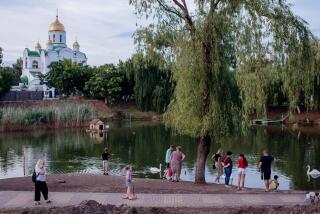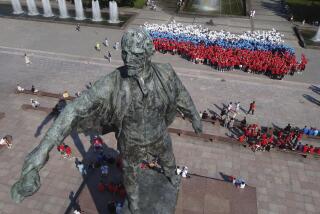Casting Out the Communists : The Soviet People--Unlike Other Colonials--Can Handle Independence
- Share via
The last great European empire is no longer. Gone with it are also the last vestiges of communist totalitarianism--a murderous utopia that claimed tens of millions of victims in the past 70 years. We should bid it good riddance and look to the future with hope. For whatever the post-Soviet political and economic reality looks like, in the long-run it is certain to be a vast improvement for the Soviet peoples and the world beyond.
This is so, because what is now happening is neither a tantrum of history nor the unforeseen denouement of the foolish actions of desperate reactionaries, but the inevitable disintegration of a state condemned by history. It is the unraveling of a political tyranny, which suppressed even elementary human rights during most of its existence, and of a multinational state that forged its artificial cohesion by oppressing the ancient cultures, traditions and national strivings of its many nations and ethnic groups. A “union” that was truly a “prison of nations,” as Vladimir I. Lenin once characterized czarist Russia.
It is also the demise of an irrational economic system predicated on the rapacious exploitation of people and resources that has left a legacy of economic ruin and environmental despoliation throughout the country.
It is this political and economic straitjacket that the Soviet peoples and nations, Russia first and foremost, are now trying to cast away in their efforts to break with the dismal past. It will not be easy, and economic duress and political uncertainty will be the order of the day for quite a while. Still, these are the birth pangs of a promising future, not yesterday’s agony of a moribund system.
The West should finally quit its anxious hand-wringing over the moribund union and its vaunted stability and get on with the business of helping smooth the transition. It should realize that such “stability” was never more than the stability of a seething volcano; the fact that it did not erupt in a burst of cataclysmic violence was no thanks to the West, but to peoples many had written off as congenitally incapable of democratic impulses.
So what is the future Soviet Union going to look like, and how would it affect the region and the world? The first thing already clear is that there is not going to be a “union” in any real sense of the word. Most of the European republics, led by the Baltics, will depart the union sooner rather than later. What’s left will become essentially a kind of commonwealth, with a towering Russia and half a dozen, mostly Muslim, republics around it. In this arrangement, the Russian president will be the real boss and the Union president but a ceremonial figure. Even this diminished construct is not likely to last.
For the Muslim republics, whose economies have been plundered and environments despoiled by decades of neo-colonial exploitation, such an arrangement may offer the hope of desperately needed assistance. It is hard to see, however, what any such configuration has to offer Russia, once the hard-nosed realities of economic self-interest become clear. For it is Russia-- with its huge resources and relatively small, well-educated population--that has the best chance of economic achievement under democracy. Unless, of course, it is encumbered by destitute client states. An additional reason for Russia to want to go it alone is the growing fear that, under a federal scheme, its underpopulated countryside would soon be swamped by the burgeoning Muslim populations to the south.
The Muslims, if left to fend for themselves, are likely to want to recreate a modern version of what was once known as Turkestan--a huge tract of land in Central Asia inhabited by Turkic-speaking nations that have a cultural and historical affinity with Turkey, whose influence is certain to grow. It already is a factor in Soviet Azerbaijan, whose people are, in fact, ethnic Turks. An exodus of Russians and Europeans from Central Asia, little noticed in the West, is transforming these areas into homogeneously native and Muslim regions. While more than 20% of the population of Central Asia--except Kazakhstan--was European in the 1970s, it is far less than half that today.
The emancipation of the Soviet Muslims cannot fail to have a contagious effect on their brethren across the Chinese border--where tens of millions of Muslims are ruled over by the Han Chinese in a manner worse than the Russians ruled Central Asia. The coming conflict in Chinese Sinkiang will surely be one of the most momentous repercussions of the demise of the Soviet empire.
The impact will be felt also in areas where Soviet state or republican borders split nations in two or leave large minorities outside. The northern part of Kazakhstan is populated by compact masses of Russians, as is the Crimea, which, though part of Ukraine, has never been Ukrainian historically. That the ethnic Romanians of Moldova will eventually join Romania is almost certain, but what will happen if and when the 7 million Soviet Azerbaijanis attempt to link with at least as many kinfolk across the Iranian border, or the 4 million Soviet Tajiks try to join with 6 million co-nationals in Afghanistan?
Conflicts there will be aplenty--but if democracy prevails, none are likely to be of the Earth-shattering nature that the erstwhile Evil Empire was capable of causing. On the other hand, once emancipated, its various parts will realize, for the first time, that there are compelling economic and geopolitical reasons for cooperation on the basis of mutual self-interest.
It may not be long before economic interdependence and regionalization start taking precedence over political and ethnic prejudice. Already, the Balts are discussing special economic ties with Leningrad, while, to the south, a Black Sea economic zone is taking shape. In the Soviet Far East, new free-trade zones assiduously cultivate ties with Asian neighbors and Alaska, even as in Tyumen, Siberia, a two-month-old commodity exchange has justified ambitions of becoming the largest oil market in the world in the near future.
Contrary to conventional wisdom and prophecies of economic doom emanating from Washington bureaucrats, most Soviet nations and future states are vastly better equipped in terms of human and economic potential to face independence than the scores of states dumped on the world scene by previous waves of decolonization. What they need from the West is not so much money and technology, as experience and advice in what democracy and the market can do to help them carry out, together with Eastern Europe, the greatest revolution of the 20th Century.
More to Read
Sign up for Essential California
The most important California stories and recommendations in your inbox every morning.
You may occasionally receive promotional content from the Los Angeles Times.













